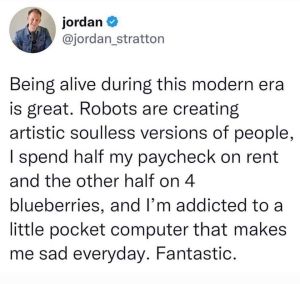Late-Stage Capitalism
Late-Stage Capitalism: The end game of capitalism is just communism but the wealth is controlled by companies not governments.
Late-Stage Capitalism has become a term widely used to describe the contemporary economic landscape, characterized by growing wealth inequality and systemic challenges. For those who born in the '90s, Generation Z finds itself at the forefront of this era, grappling with the consequences of a system that seems to favor the few at the expense of the many. This article delves into the issues faced by this generation, including the role of the US Dollar as a legal tender, the disparity in property ownership, and the repercussions of Late-Stage Capitalism on the younger workforce.
The US Dollar and Economic Power:
As the world's reserve currency, the US dollar holds a unique position in the global financial system. Its status as a legal tender for taxes and global trades gives it an undeniable influence over economic transactions. However, the concentration of economic power in the hands of a few is a key concern. The Federal Reserve's policies and the government's deficit spending have allowed wealth to accumulate primarily among the already affluent, leaving the younger generations struggling to achieve financial stability.
Boomers and Property Ownership:
One of the most significant disparities amplified by Late-Stage Capitalism is the stark contrast in property ownership. Many baby boomers were fortunate enough to enter the real estate market at a time when property prices were relatively low, enabling them to accumulate substantial wealth through home ownership. This advantage has left younger generations, particularly Gen Z, grappling with skyrocketing housing prices and limited access to affordable housing.
The Antiwork Culture and the Rise of Tang Ping:
Caught in a cycle of economic disparity, low wages, and mounting debts, Gen Z has witnessed the rise of the antiwork culture as a form of passive resistance. "Tang ping," or lying flat, has gained popularity as a rational response to the challenges imposed by Late-Stage Capitalism. It reflects a growing sentiment that traditional notions of success and relentless pursuit of financial gain may not guarantee happiness or security in a system that seems inherently stacked against the majority.
A Call for Systemic Change:
To address the systemic issues rooted in Late-Stage Capitalism, a collective effort is needed. Recognizing the importance of financial literacy and advocating for equal opportunities in education can empower younger generations to navigate the economic landscape effectively. Additionally, pushing for policies that promote fair wages, affordable housing, and comprehensive social safety nets can help mitigate the adverse effects of wealth concentration and foster a more inclusive society.
Conclusion:
Late-Stage Capitalism has brought to the forefront the stark inequalities and challenges faced by Generation Z. The influence of the US dollar as a legal tender and the disparities in property ownership exemplify the systemic issues deeply rooted in our economic system. By acknowledging these issues and advocating for change, we can work towards creating a more equitable society that offers equal opportunities and financial security for all. It is through collective action and systemic reforms that we can strive for a future that mitigates the adverse effects of Late-Stage Capitalism and builds a more just and inclusive world.
Significance in MoNoRi-Chan's story
Late-Stage Capitalism: A Journey of Liberation for MoNoRi-Chan
Late-stage capitalism, an era marked by income inequality, labor exploitation, and the pursuit of profit at any cost, served as the backdrop of MoNoRi-Chan's personal story. Born into a world where the value of labor was often undermined, he found himself trapped in a cycle of working for minimum wage while facing constant exploitation from profit-driven entities.
For MoNoRi-Chan, this reality became a catalyst for change. Fueled by a burning desire for financial freedom and autonomy, he set out on a path to break free from the chains of traditional labor. Forex trading emerged as his weapon of choice—an opportunity to challenge the status quo and carve out a new destiny for himself.
Embracing the challenge of forex trading, MoNoRi-Chan rode the DXY wave alone, navigating the complex world of currency markets with skill and precision. He delved into the depths of technical analysis and risk management, seeking to understand the forces that shaped global economies and their impact on currency fluctuations.
But MoNoRi-Chan's journey was not one of solitary conquest. The power of friendship and support played a crucial role in his pursuit of liberation. Surrounded by a community of like-minded individuals, he found strength in unity. Friends who shared a common goal of financial autonomy stood beside him, providing guidance and encouragement along the way.
In the face of the normal distribution curve, where market outcomes are distributed in a bell-shaped pattern, MoNoRi-Chan embraced the uncertainties and fluctuations. He understood that success was not guaranteed, but he persevered with a passion that refused to be deterred.
Through forex trading, MoNoRi-Chan began to transcend the limitations of late-stage capitalism. He uncovered a path to financial liberation, where his efforts and expertise were rewarded directly, without intermediaries profiting at his expense.
As MoNoRi-Chan's forex journey unfolded, he shed the chains of labor exploitation and embraced a new identity—an NEET (Not in Education, Employment, or Training) armed with the knowledge and power to take control of his own destiny. He found himself liberated from the confines of a system that had once held him captive.
Late-stage capitalism may have been the main setting of MoNoRi-Chan's story, but it was his resilience, determination, and unwavering pursuit of freedom that turned the tide. As he rode the waves of change, he proved that one individual can challenge the norms, disrupt the system, and chart a course towards a better future.
Disclaimer: This section is a fictional narrative and does not depict real events or individuals. It is created for entertainment purposes only.

